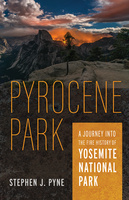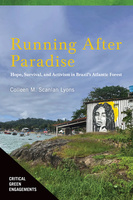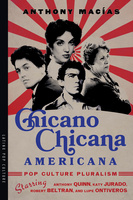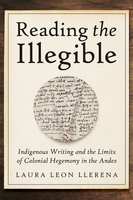The University of Arizona Press is the premier publisher of academic, regional, and literary works in the state of Arizona. They disseminate ideas and knowledge of lasting value that enrich understanding, inspire curiosity, and enlighten readers. They advance the University of Arizona’s mission by connecting scholarship and creative expression to readers worldwide.
Pyrocene Park
A Journey into the Fire History of Yosemite National Park
Persistence of Good Living
A’uwe Life Cycles and Well-Being in the Central Brazilian Cerrados
For the Indigenous A’uwẽ (Xavante) people in the tropical savannas of Brazil, special forms of intimate and antagonistic social relations, camaraderie, suffering, and engagement with the environment are fundamental aspects of community well-being. In this work, the author transparently presents ethnographic insights from long-term anthropological fieldwork in two A’uwẽ communities, addressing how distinctive constructions of age organization contribute to social well-being in an era of major ecological, economic, and sociocultural change.
Mexican Waves
Radio Broadcasting Along Mexico's Northern Border, 1930–1950
Indigenous Justice and Gender
This new book offers a broad overview of topics pertaining to gender-related health, violence, and healing. Employing a strength-based approach (as opposed to a deficit model), the chapters address the resiliency of Indigenous women and two-spirit people in the face of colonial violence and structural racism.
Walking Together
Central Americans and Transit Migration Through Mexico
Revealing Rebellion in Abiayala
The Insurgent Poetics of Contemporary Indigenous Literature
Foodways of the Ancient Andes
Transforming Diet, Cuisine, and Society
Black Women and da ’Rona
Community, Consciousness, and Ethics of Care
Deliberately writing against archival erasure and death-driven logics of anti-Blackness, this volume chronicles Black women’s aliveness, ethics of care, and rituals of healing. The nineteen contributors from interdisciplinary fields and diverse backgrounds situate Black women’s multidimensional experiences with COVID-19 and other violences that affect their lives. The stories they tell are connected and interwoven, bound together by anti-Black gendered COVID necropolitics and commitments to creating new spaces for breathing, healing, and wellness.
The Unequal Ocean
Living with Environmental Change along the Peruvian Coast
Based on a decade of ethnographic and archival research in Peru, this volume reveals how prevailing representations of the ocean obscure racialized disparities and the ways that different people experience the impacts of the climate crisis. The book also addresses expanding scholarly interest in the world’s oceans as sites for thinking about social inequities, environmental politics, and multispecies relationships.
Carbon Sovereignty
Coal, Development, and Energy Transition in the Navajo Nation
This deep dive into the coal industry and the Navajo Nation captures a pivotal moment in the history of energy shift and tribal communities. Geographer Andrew Curley spent more than a decade documenting the rise and fall coal, talking with those affected most by the changes—Diné coal workers, environmental activists, and politicians.
Households on the Mimbres Horizon
Excavations at La Gila Encantada, Southwestern New Mexico
This book explores variability in Mimbres Mogollon pithouse sites using a case study from La Gila Encantada to further our understanding of the full range of pithouse occupations in the area. Because the site is away from the major river valleys, the data from excavations at the site provides valuable information on the differences in cultural practices that occurred away from the riverine villages, as well as environmental differences, economic practices, and social constructs.
Border Water
The Politics of U.S.-Mexico Transboundary Water Management, 1945–2015
Border Water places transboundary water management in the frame of the larger binational relationship, offering a comprehensive history of transnational water management between the United States and Mexico. As we move into the next century of transnational water management, this important work offers critical insights into lessons learned and charts a path for the future.
The Carbon Calculation
Global Climate Policy, Forests, and Transnational Governance in Brazil and Mozambique
The Carbon Calculation critically highlights the ways in which politics has reinforced a scientific focus on one possible solution to the problem of climate change—namely those that largely absolve the industrialized world from undertaking politically painful transformations in its own economic model.
Occupying Our Space
The Mestiza Rhetorics of Mexican Women Journalists and Activists, 1875–1942
Lotería
Nocturnal Sweepstakes
My Heart Is Bound Up with Them
How Carlos Montezuma Became the Voice of a Generation
Centering historically neglected Indigenous voices as its primary source material, author David Martínez shows how Carlos Montezuma’s correspondence and interactions with his family and their community influenced his advocacy—and how his important work in Arizona specifically motivated his work on a national level.
Voluntourism and Multispecies Collaboration
Life, Death, and Conservation in the Mesoamerican Barrier Reef
An ethnographic exploration of the world of conservation voluntourism and relations of care between humans and vulnerable species on the Honduran Bay Island of Utila.
Running After Paradise
Hope, Survival, and Activism in Brazil's Atlantic Forest
This book looks at social-environmental activism in one of the world’s most important and threatened tropical forests—Southern Bahia, Brazil. It explores what it means to be in and of a place through the lenses of history, environment, identity, class, and culture. It uncovers not only what separates people but also what brings them together as they struggle and strive to create their individual and collective paradise.
Chicano-Chicana Americana
Pop Culture Pluralism Starring Anthony Quinn, Katy Jurado, Robert Beltran, and Lupe Ontiveros
This exciting new cultural history documents how Mexican Americans in twentieth-century film, television, and theater surpassed stereotypes, fought for equal opportunity, and subtly transformed the mainstream American imaginary. Through biographical sketches of underappreciated Mexican American actors, this work sheds new light on our national character and reveals the untold story of a multicentered, polycultural America.





















